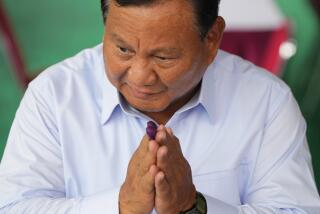Albright Backs Indonesia’s Democratic Drive
- Share via
JAKARTA, Indonesia — Secretary of State Madeleine Albright today pledged support for Indonesia’s “new spirit of democracy” as the world’s fourth-most-populous nation gears up for its first free elections in 44 years.
Yet after meeting President B. J. Habibie, Albright told a news conference that she was concerned about human rights abuses by the army and police in riots that have roiled the capital and other parts of the vast archipelago nation in recent weeks.
Albright said Habibie suggested asking former U.S. President Carter to help monitor the June 7 parliamentary elections.
The Clinton administration is considering contributing about $30 million to assist the election process, according to a senior U.S. official.
The outgoing legislature largely was chosen by former President Suharto, the longtime strongman who resigned in May after 32 years in power when anti-government protests exploded across the country.
A period of relative calm then gave way to an upsurge of ethnic, religious and political bloodshed in several provinces, with scores of clashes and more than 150 deaths reported since the year began.
After arriving here Thursday night from Thailand, Albright praised Habibie’s sudden offer in January to grant greater autonomy or full independence to strife-torn East Timor, the former Portuguese colony that Indonesia seized in 1975. She lent support to Jakarta’s position, however, that it need not conduct a popular referendum to gauge public opinion in the province before deciding its future.
Critics have accused Jakarta of refusing to stage a referendum for fear that pro-independence forces almost surely would prevail. Supporters of integration, in turn, have warned that civil unrest or worse could engulf East Timor if Indonesia abruptly abandons the bitterly divided province.
Albright said Washington will respect whatever process the government chooses as long as it “allows for a variety of views” and is “credible.”
Indonesian Foreign Minister Ali Abdullah Alatas told reporters that a referendum in East Timor would be impossible to conduct unless “a very sizable” force of U.N. peacekeeping troops is sent in.
State Department spokesman James P. Rubin said talk of sending peacekeepers is “premature” until negotiations at the United Nations on the future of East Timor are concluded. Privately, U.S. officials view Alatas’ call for peacekeepers as a veiled threat to the outside world not to push Jakarta into holding a referendum.
Alatas also denied as “totally unfounded” widespread reports that the Indonesian army has supplied guns to groups in East Timor that support political integration with Jakarta. Recent weeks have seen widespread clashes in the province between pro-autonomy and pro-independence forces.
Instead, he said, Jakarta has reactivated local militias called the People’s Guard across Indonesia.
“We are selectively training them and selectively arming them,” he said. Most members are given only cudgels, he said, and any rifles or other firearms distributed are kept under police control.
“Why should we want instability in East Timor?” he asked heatedly. “We have no interest in arming one group or another. Why should we instigate a situation we cannot control?”
Albright’s planned meeting at noon today with former East Timor guerrilla leader Jose Alexandre “Xanana” Gusmao was delayed when her motorcade was turned back by protests outside the bungalow where he is being held under house arrest. Albright’s aides said Gusmao, who was imprisoned in 1992 and is expected to be East Timor’s first president if it gains independence, would be brought to the Foreign Ministry to meet Albright.
Earlier Thursday in Bangkok, Thailand, Albright rejected a warning by Cambodian Prime Minister Hun Sen that civil war in Cambodia could resume if an international war crimes tribunal is created to prosecute top Khmer Rouge leaders for their role in the 1975-79 genocide in that country.
She discounted Hun Sen’s preference for a South African-style truth commission to expose the executions, torture, forced labor and starvation that left more than 1 million dead during the Khmer Rouge era.
“A truth commission is not a substitute for an international tribunal,” Albright said. Trials are “necessary for reconciliation,” she added.
A U.N. panel this week recommended creating a special tribunal for Cambodia, similar to those created for Rwanda and the former Yugoslav federation. Hun Sen warned in a letter to U.N. Secretary-General Kofi Annan that such trials would “panic” Khmer Rouge leaders and their followers.
More to Read
Sign up for Essential California
The most important California stories and recommendations in your inbox every morning.
You may occasionally receive promotional content from the Los Angeles Times.














